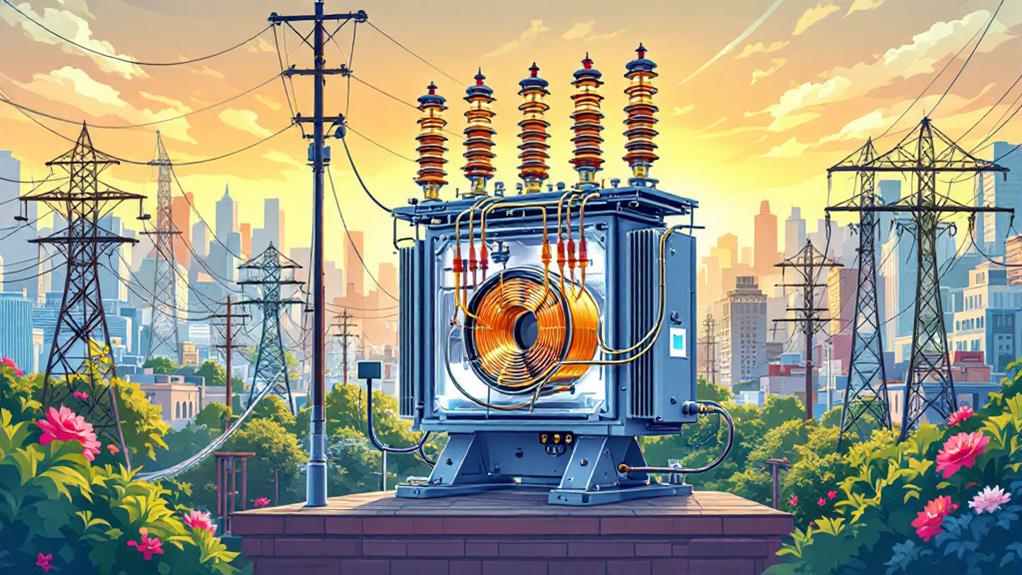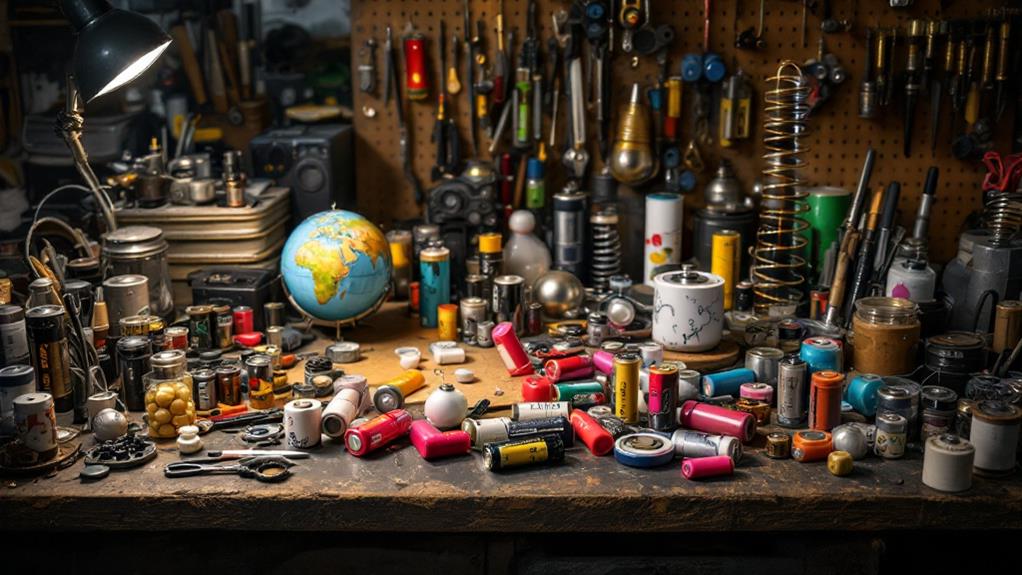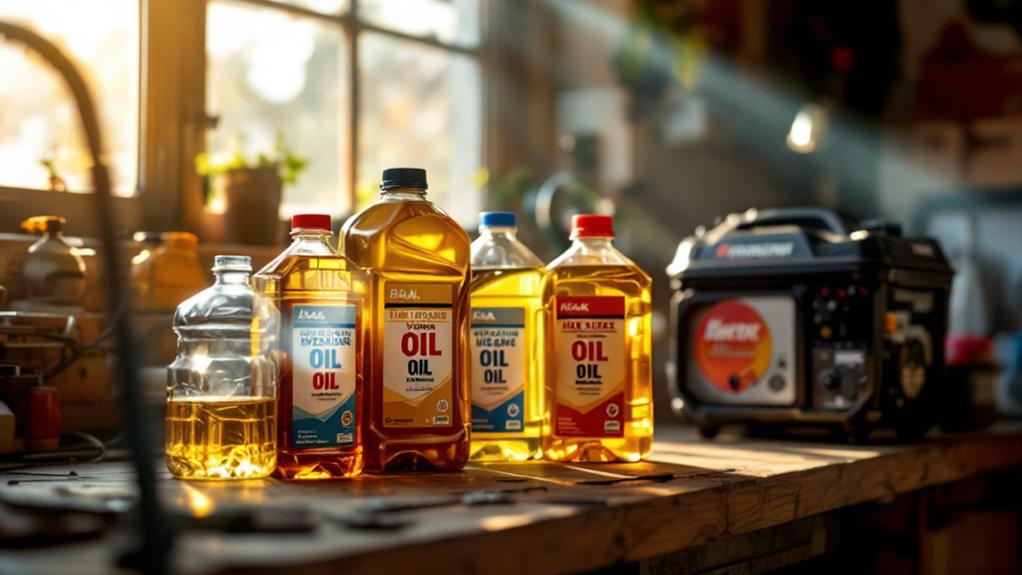Best Generators for Home Use: The Ultimate Buyer’s Guide
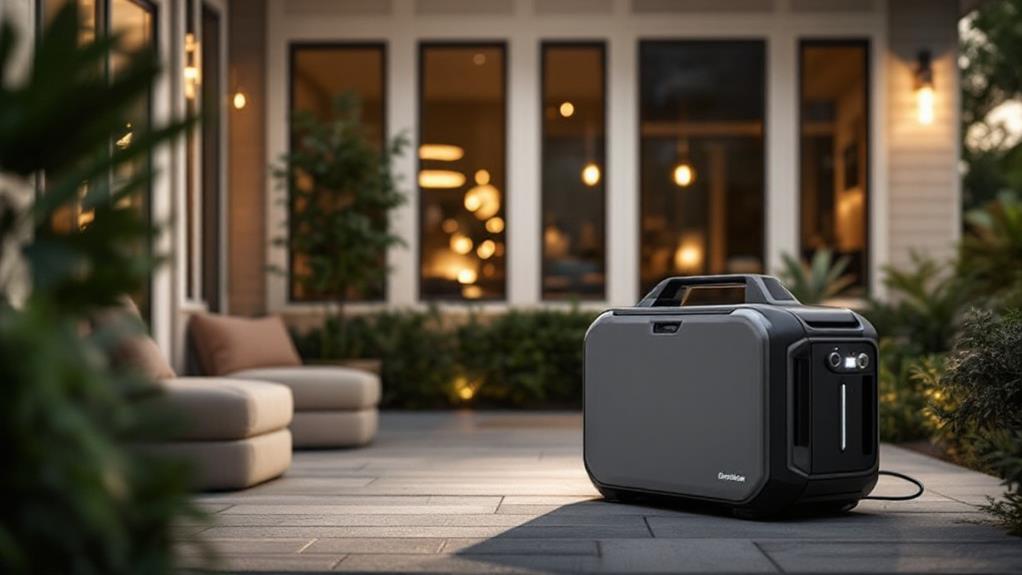
When choosing the best generator for your home, you'll need to examine several factors. Start by determining your power needs and deciding between portable or standby systems. Portable generators offer flexibility, while standby units provide automatic, whole-house backup. Evaluate fuel options like gasoline, propane, or natural gas, each with its pros and cons. Look for features such as multiple outlets, electric start, and fuel efficiency. Don't forget to factor in noise levels, runtime, and safety features. Top brands like Generac, Honda, and Briggs & Stratton offer reliable options. By understanding these key aspects, you'll be well-equipped to make the right choice for your home's backup power needs.
Types of Home Generators
When it comes to powering your home during outages, you've got several generator options to choose from. The main types of home generators include portable, standby, and inverter generators. Each has its own advantages and is suited for different needs.
Portable generators are versatile and can be moved around as needed. They're ideal for occasional use and smaller power requirements. However, they require manual setup and fuel refills. Standby generators, on the other hand, are permanent installations that automatically kick in when the power goes out. They're perfect for whole-house backup but require professional installation and a larger investment.
Inverter generators are a newer technology that provides cleaner power, making them safe for sensitive electronics. They're also quieter and more fuel-efficient than traditional portable generators. When selecting a generator, consider the generator size needed to power your essential appliances and the generator location. Portable units should be placed outdoors, away from windows and doors, while standby generators need a permanent outdoor location near your home's electrical panel. Always prioritize safety and follow manufacturer guidelines for installation and operation.
Power Output Considerations
Now that you're familiar with the types of generators available, it's important to focus on power output considerations. The key to selecting the right generator is understanding your home's electrical load requirements. Start by listing all the essential appliances and devices you'll need to power during an outage. Calculate their combined wattage to determine your minimum backup power capacity.
Remember that some appliances, like refrigerators and air conditioners, require additional starting watts. Factor this into your calculations to verify your generator can handle the surge. It's wise to choose a generator with slightly more capacity than you think you'll need, allowing for future additions or unexpected power demands.
Consider prioritizing your power needs. You might not need to run every device simultaneously during an outage. This approach can help you select a more appropriately sized generator. Don't forget to account for seasonal variations in power usage, such as increased demand for heating or cooling during extreme weather events. By carefully evaluating your power output needs, you'll be better equipped to choose a generator that provides reliable backup power for your home.
Fuel Options
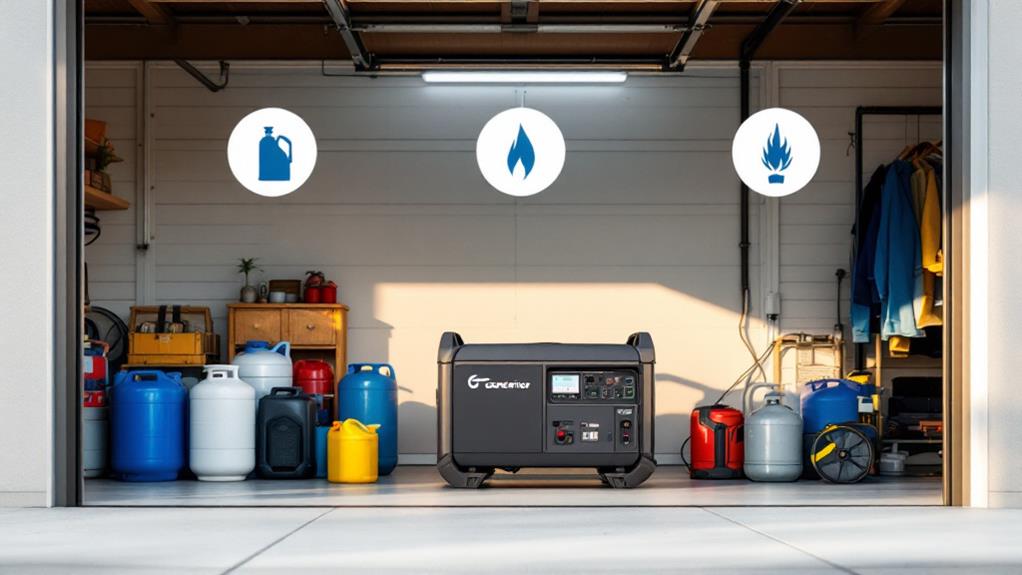
Your choice of fuel for your home generator is essential, as it affects performance, cost, and convenience. The most common fuel options include gasoline, propane, diesel, and natural gas. Each has its pros and cons.
Gasoline generators are widely available and relatively inexpensive, but they require frequent refueling and have shorter shelf lives. Propane offers clean-burning operation and longer storage life, but it's less energy-dense than other fuels. Diesel generators are known for their efficiency and longevity, but they're often louder and more expensive upfront.
Natural gas generators connect directly to your home's gas line, eliminating fuel storage considerations. However, they're less portable and depend on the reliability of your gas supply.
When choosing a fuel type, consider your specific needs and local availability. Factor in fuel storage considerations, such as safety regulations and space requirements. Also, pay attention to fuel quality requirements, as some generators are more sensitive to impurities or stale fuel. Regular maintenance and proper fuel storage practices will help maintain your generator's performance when you need it most.
Portability vs. Standby Systems
After considering fuel options, another key decision in choosing a home generator is whether to opt for a portable unit or a standby system. Portable generators offer flexibility and can be moved as needed, making them ideal for camping trips or powering specific appliances during outages. They're typically more affordable and have a compact design, but may lack the power output of larger systems. Standby generators, on the other hand, are permanently installed and automatically kick in when power fails, providing seamless backup for your entire home.
When deciding between portable and standby systems, consider:
- Power needs: Portable units are suitable for basic appliances, while standby systems can power your whole house.
- Installation: Portable generators require minimal setup, whereas standby systems need professional installation.
- Maintenance: Standby generators often have self-diagnostic features, while portable units need more frequent manual checks.
Both types have made strides in noise reduction, but standby systems generally run quieter. Ultimately, your choice depends on your budget, power requirements, and how often you anticipate needing backup power. Assess your needs carefully to determine which type best suits your home and lifestyle.
Noise Levels
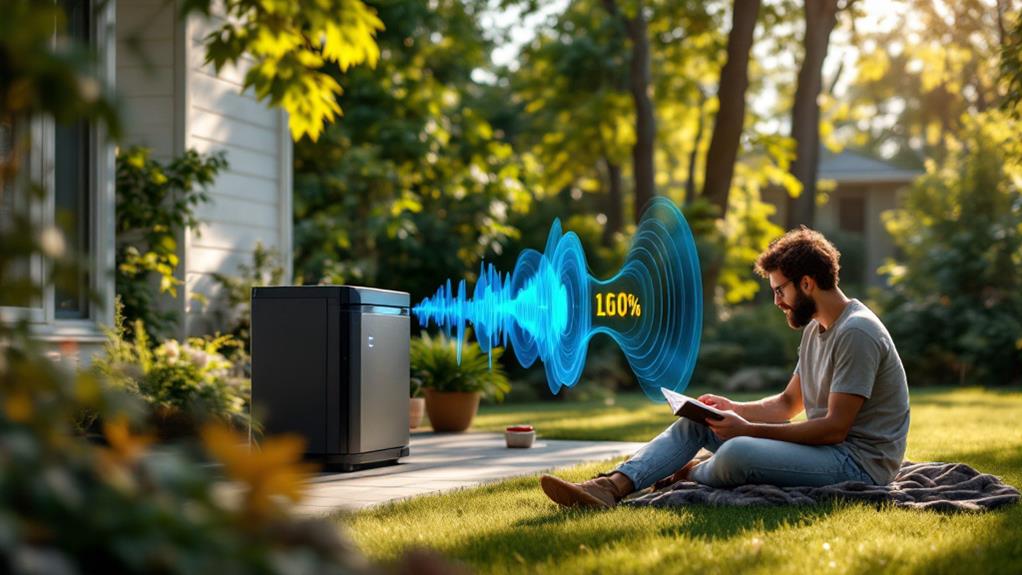
Decibels matter when it comes to home generators. You'll want to contemplate the noise levels produced by different models to guarantee your generator doesn't become a nuisance to you or your neighbors. Most residential generators operate between 60 and 70 decibels, which is comparable to the sound of a normal conversation or a vacuum cleaner.
When shopping for a generator, look for models with sound dampening features. These can include noise-reducing enclosures, mufflers, and vibration isolation systems. Some manufacturers have developed innovative designs that drastically reduce noise output, making their generators much quieter than traditional models.
It's also important to contemplate ambient noise reduction techniques when installing your generator. Placing the unit away from living areas and using sound barriers can help minimize disruption. Some homeowners opt to build a dedicated enclosure for their generator, which can further reduce noise levels.
Remember that inverter generators are typically quieter than conventional models, making them a popular choice for residential use. They adjust engine speed based on power demand, resulting in lower noise output and improved fuel efficiency.
Runtime and Fuel Efficiency
When it comes to home generators, runtime and fuel economy are critical considerations. You'll want a generator that can power your essential appliances for extended periods without frequent refueling. The fuel capacity and runtime per tank are key factors to examine when choosing the right generator for your needs.
- Fuel type: Generators can run on gasoline, propane, or diesel, each with different efficiency levels and runtime capabilities.
- Load management: Running your generator at lower capacities can enormously extend its runtime and improve fuel efficiency.
- Inverter technology: Inverter generators are generally more fuel-efficient than traditional models, adjusting engine speed to match power demand.
To maximize runtime and fuel efficiency, look for generators with larger fuel tanks and advanced features like eco-mode. Some models can run for up to 18 hours on a single tank, while others may need refueling every 6-8 hours. Contemplate your power needs and how often you're willing to refuel when selecting a generator. Remember, a more fuel-efficient model may cost more upfront but can save you money in the long run.
Key Features to Look For
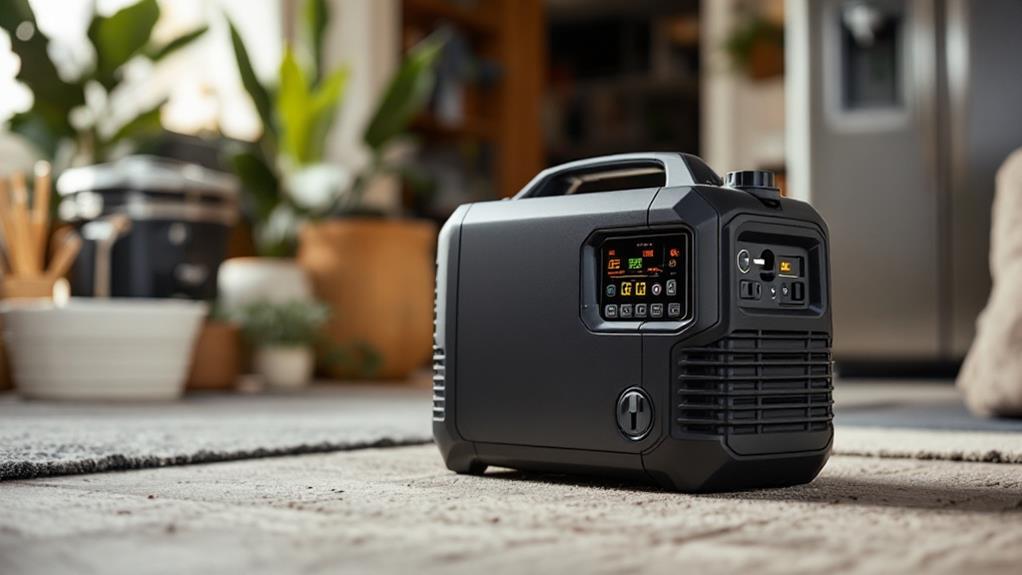
Choosing the right generator for your home involves considering several key features that can make a significant difference in your experience. When selecting a backup power supply, prioritize models with automatic start functionality. This guarantees your generator kicks in seamlessly during outages, minimizing disruption to your daily life.
Look for generators with multiple outlets to accommodate various appliances and electronics. A mix of 120V and 240V outlets provides versatility for different power needs. Energy efficiency is essential, so opt for models with eco-mode or smart throttle features that adjust engine speed based on load, conserving fuel and reducing noise.
Consider generators with electric start options for convenient operation, especially in adverse weather conditions. Built-in fuel gauges help you monitor consumption, while low-oil shutoff protects the engine from damage. Portability is vital for storage and positioning, so check for wheel kits and sturdy handles.
Lastly, don't overlook safety features like circuit breakers and carbon monoxide detectors. These protect your home and family from electrical hazards and harmful emissions. By focusing on these key features, you'll ascertain your generator meets your specific needs and provides reliable backup power when you need it most.
Top Generator Brands Compared
The market for home generators is dominated by several reputable brands, each offering unique features and benefits. When comparing top generator brands, you'll want to examine factors such as generator durability, reliability, and overall performance. Some of the most well-known names in the industry include Generac, Honda, and Briggs & Stratton.
To help you make an informed decision, here's a quick comparison of these top brands:
- Generac: Known for their wide range of residential generators, Generac offers both portable and standby options. They're praised for their reliability and innovative features.
- Honda: Renowned for their engine technology, Honda generators are highly regarded for their fuel efficiency and quiet operation.
- Briggs & Stratton: With a long history in small engine manufacturing, Briggs & Stratton provides durable generators at competitive prices.
Each brand has its strengths, so you'll need to weigh your specific needs against what they offer. Ponder factors like power output, fuel type, and warranty coverage when making your choice. Don't forget to read customer reviews and expert opinions to get a better understanding of each brand's generator durability and reliability in real-world scenarios.
Installation and Maintenance
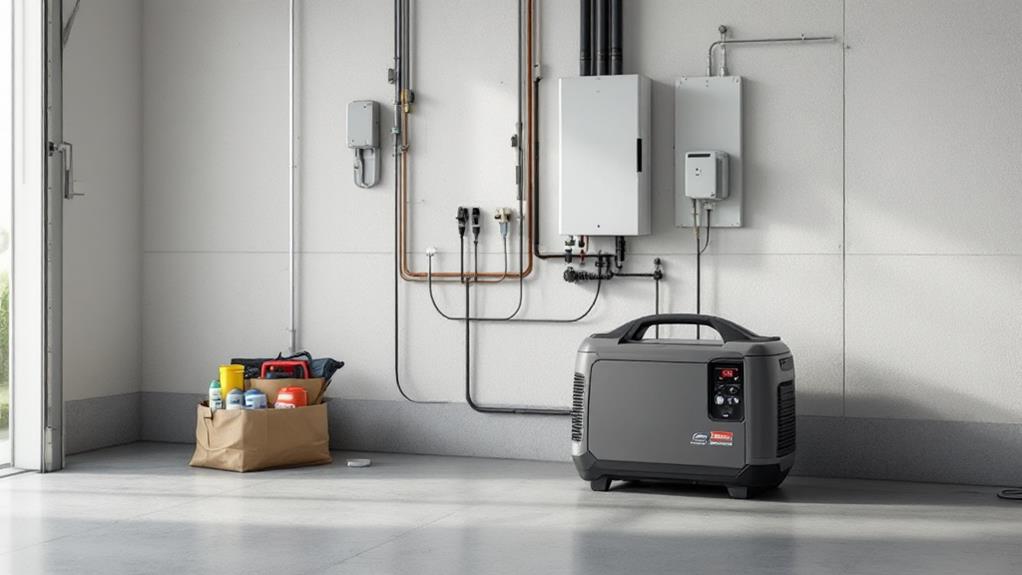
Proper installation and regular maintenance are essential for your generator's longevity and performance. When installing your generator, you'll need to consider electrical wiring requirements and ensure a proper ventilation setup. It's paramount to have a licensed electrician handle the wiring to meet local codes and safety standards. They'll install a transfer switch, which safely connects your generator to your home's electrical system.
For ventilation, place your generator outdoors in a well-ventilated area, at least 20 feet from your home. This prevents carbon monoxide buildup and reduces noise. Install carbon monoxide detectors inside your home for added safety.
Maintenance is key to keeping your generator ready for use. Perform regular oil changes, typically every 50-200 hours of use or annually. Check and replace air filters as needed. Inspect fuel lines for leaks or damage. Test your generator monthly by running it for 30 minutes to keep components lubricated and batteries charged. During extended periods of non-use, add fuel stabilizer to prevent carburetor issues. Keep spare parts on hand, such as spark plugs and oil filters, for quick repairs when needed.
Safety Precautions
Prioritize safety when operating your home generator to prevent accidents and guarantee proper functioning. Always follow the manufacturer's guidelines and local regulations to ascertain you're using your generator correctly and safely.
Proper ventilation is pivotal when running a generator. Never operate it indoors or in enclosed spaces, as this can lead to carbon monoxide buildup, which is deadly. Place your generator outdoors, at least 20 feet away from windows, doors, and vents. Install carbon monoxide detectors in your home for added protection.
Electrical safety is equally important. Use heavy-duty, outdoor-rated extension cords to connect appliances to your generator. Don't overload the generator by exceeding its rated capacity. Keep the generator dry and protected from rain or snow.
Always allow the generator to cool down before refueling
Store fuel in approved containers away from living areas
Ground your generator properly to prevent electrical shock
Regularly inspect your generator for any signs of wear or damage. If you notice anything unusual, such as strange noises or smells, shut it off immediately and consult a professional. By following these safety guidelines, you'll certify your generator operates efficiently and safely during power outages.

